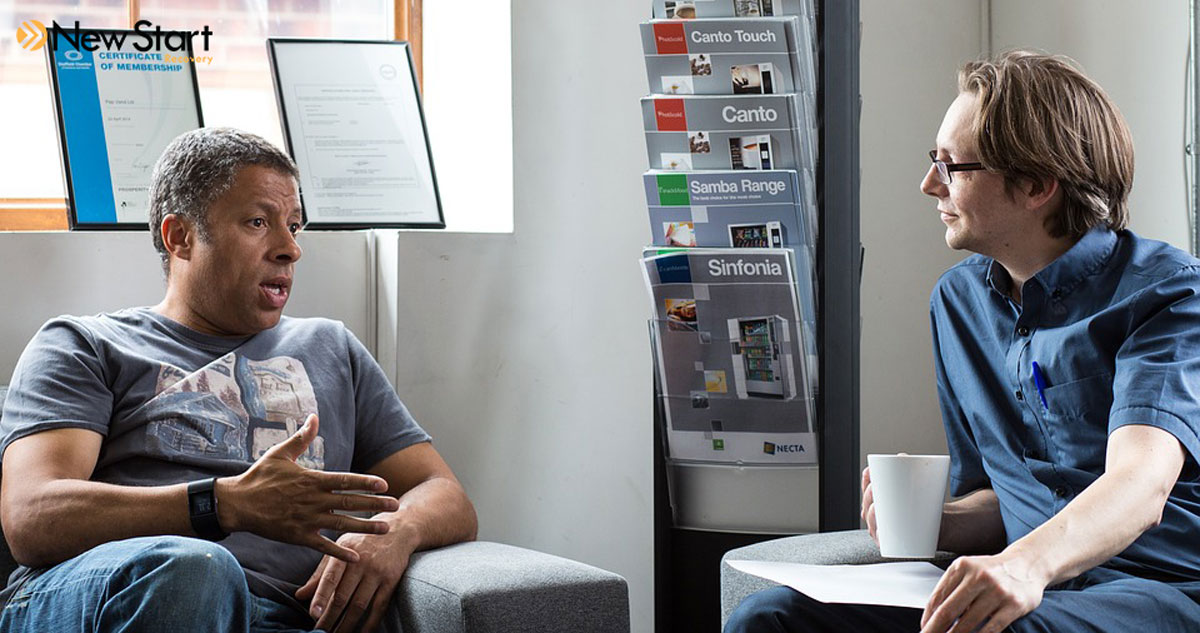If you’ve considered joining Alcoholics Anonymous and using the 12 Steps as a part of your recovery, then you’ve probably had a moment of realization that you don’t actually know how to be a part of AA. Do you just show up? What are you supposed to say? Are there rules? How the heck do I complete the 12 steps if I don’t even know how? Don’t panic. This is where a sponsor comes in.

But now you’re probably wondering how to even get a sponsor. Well, you’re in luck! Take it from a self-proclaimed worrywart, who obsesses over every tiny aspect imaginable (although I generally try pretty hard to find other, nicer nouns than “wart” when describing myself), this list will help you with of all the things you might ever wonder about when looking for a sponsor.
What Do I Need a Sponsor For?
In AA, a sponsor is someone who has already completed the 12 Steps and is established in their own recovery. They’ll take on sponsees and guide them through the steps. The 12 Steps are an essential part of Alcoholics Anonymous. However, you don’t know how to complete them when you first join AA because you’ve never worked them before. Your sponsor will explain each step to you and help you complete them by offering guidance as well as emotional support. He’ll also help you learn the different nuances and guidelines of the program. And, above all, a sponsor is someone who is always available for fellowship, emotional support, and advice throughout your recovery.
What Should I Look for in a Sponsor?
A recovering addict is very vulnerable in their early stages of recovery. Unfortunately, not everyone will be a good choice for support and friendship during these stages. So, it’s very important that you choose your sponsor wisely. There are a few things you should be looking for when getting a sponsor (not necessarily in this order):
-
Personal Connection
Everyone is different. We all come from different backgrounds with different stories and experiences. It’s important to find someone that you personally click with. Not everything is going to be fun and games with your sponsor, but they should definitely be someone you can be friends with. If you don’t feel that personal connection, it’ll be difficult for you to be open and vulnerable with the person.
-
Established in Their Own Recovery
A sponsor needs to have a strong foundation in their own recovery before they can help someone else. You want to find someone who can offer guidance and support, not someone that you feel unsure around. Never choose someone who has less time than you, has recently relapsed, or seems to be a little shaky in their own recovery.
-
Gender
It’s generally recommended that you find a sponsor who is the same gender as you. Men and women can both be great sponsors. However, our own gender plays a role in how we think about things, deal with things, and generally go about life. (The theory essentially falls in line with the “women are more emotional” and “men focus less on feelings” stereotypes). You want someone who experiences things in relatively the same way you do. That generally means someone with the same gender as you.
-
Relative Location
Most of the people who attend the same meetings as you will probably live relatively close to that meeting. So, this recommendation usually happens naturally. But, in the case that it doesn’t, you’ll want to get a sponsor who lives somewhat close to you. This is because you’ll do step work with them outside of the meeting and most of that step work will be done in person. There may also be times that you just need a friend and a little dose of human connection throughout your recovery. Having your sponsor be just a few miles away will help so much in times of need when a phone call just isn’t enough.
-
Number of Sponsees
You’ll probably also want to look at how many other sponsees your potential sponsor has. If they have multiple sponsees, that’s probably a good sign that they’re a good sponsor. But you also don’t want to pick someone who has too many sponsees because their focus and time will be spread too thin. You want to find someone who can give you the time that you need.
-
Positivity
This may seem self-explanatory, but it’s important to touch on nonetheless. Positivity is a huge thing in recovery. It can be easy to lose focus and motivation, especially in long-term recovery. So, you want someone who helps you stay positive through their own positivity. You’ll also want someone who can push you to actively participate in recovery, such as by sharing in meetings and incorporating the 12 steps into your daily life.
Dos and Don’ts When Getting a Sponsor:
Do Set Boundaries
Your sponsor is there to help you navigate the program, take you through the steps, and offer fellowship and support. He is not there to diagnose you, help you with legal issues, or give you financial support. It’s very important that you and your sponsor set boundaries regarding these things and that you continuously respect them. Your sponsor should be able to give you the time and focus you need from him, but remember that he has a life too. Respect it and he’ll respect yours.
Do Stay Open
The only way your sponsor can help you is if you’re open and honest with them. I realize that this is a hard thing to do for many people, but your efforts will pay off. Your sponsor is there to offer emotional support and give you advice. They’re not there to judge or criticize you. After all, sponsors are recovering addicts too.
Do Get Outside Help As Well
Your sponsor will be a big help in your recovery. However, there are some things that he or she can’t help. Sponsors are not perfect and generally don’t have professional training. If you feel like you need professional therapy, don’t be afraid to look for a counselor or therapist as well.
Do Have Faith in Yourself
Sponsors will help with a lot of things in recovery, but it’s important that you put faith in yourself too. You don’t need to rely on your sponsor for everything. Remember that you’re incredibly capable and strong in and of yourself as well.
Don’t Decide Too Quickly
Choosing a sponsor is something you should put a lot of thought into. You should avoid making any rash decisions during this process. Instead, talk to many different people, observe the way they interact with others, and take the time to find the person you click with best.
Don’t Get Romantically Involved
Getting romantically involved with your sponsor is one of the quickest ways to destroy that relationship. It is also very detrimental to your recovery as a whole. If you and your sponsor are romantically involved, your relationship will become convoluted and biased. It will be impossible for them to give you the right type of support and guidance.
- Tip: Remember that the unofficial “13th step” does exist. Unfortunately, people sometimes prey on recovery newcomers. Be wary of the people who seem too eager and insistent on taking you out.
Don’t Stay in an Unhealthy Sponsorship
If your relationship is not working out with one person, it’s perfectly okay to switch sponsors. Sometimes we outgrow certain relationships as we mature and experience things. If your relationship with your sponsor isn’t mutually rewarding anymore, don’t feel obligated to stay with that person. Do what’s best for your recovery. Additionally, you should also find another sponsor if yours relapses. Relapse is an unfortunate but normal part of recovery. And while your sponsor may be a type of role model for you, they’re only human.
A Sponsor Might Not Be Your Thing
While utilizing a sponsor is typically recommended in AA, it’s not required. Some people do better without one. And that’s okay. But it’s important to make sure that you are still receiving the fellowship support either way. If you don’t want to get a sponsor, consider utilizing other support channels, such as your treatment facility’s alumni program.

Finding and building that bond with a sponsor can be an exciting, eye-opening, and healing experience. Just make sure your put a good amount of thought into your decision and remember to do whatever is best for your own recovery.
A sponsor can help you stay sober, but you have to get sober first. If you or someone you know is struggling with addiction, New Start can help. Call us at 855-737-7363 for a free and confidential screening.

